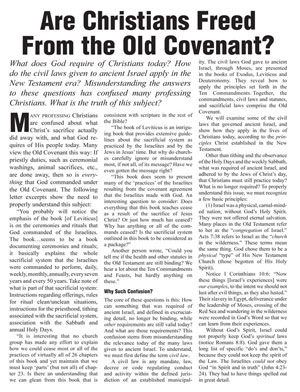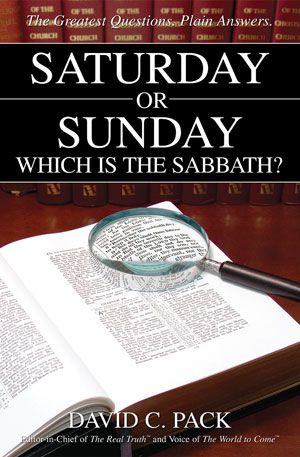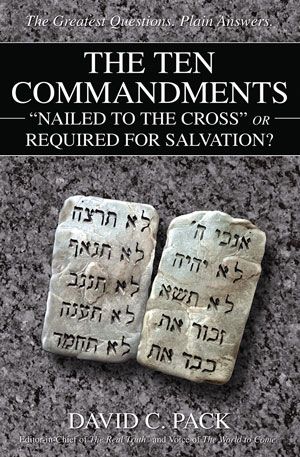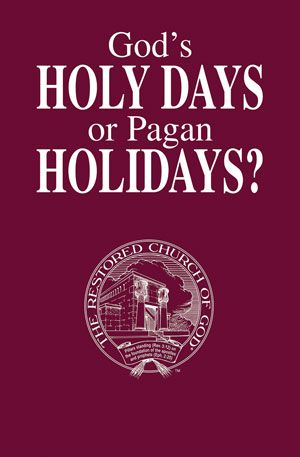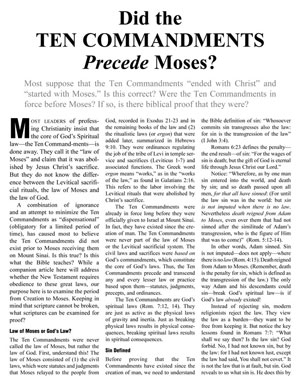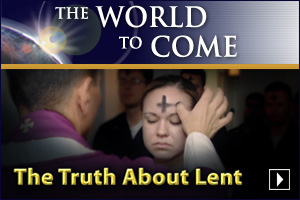Many professing Christians are confused about what Christ’s sacrifice actually did away with, and what God requires of His people today. Many view the Old Covenant this way: If priestly duties, such as ceremonial washings, animal sacrifices, etc., are done away, then so is everything that God commanded under the Old Covenant. The following letter excerpts show the need to properly understand this subject:
“You probably will notice the emphasis of the book [of Leviticus] is on the ceremonies and rituals that God commanded of the Israelites. The book…seems to be a book documenting ceremonies and rituals; it basically explains the whole sacrificial system that the Israelites were commanded to perform, daily, weekly, monthly, annually, every seven years and every 50 years. Take note of what is part of that sacrificial system: Instructions regarding offerings, rules for ritual clean/unclean situations, instructions for the priesthood, tithing associated with the sacrificial system, association with the Sabbath and annual Holy Days.
“It is interesting that no church group has made any effort to explain how we could cease most or all of the practices of virtually all of 26 chapters of this book and yet maintain that we must keep ‘parts’ (but not all) of chapter 23. Is there an understanding that we can glean from this book that is consistent with scripture in the rest of the Bible?
“The book of Leviticus is an intriguing book that provides extensive guidelines about the sacrificial system as practiced by the Israelites and by the Jews in Jesus’ time. But why do churches carefully ignore or misunderstand most, if not all, of its message? Have we even gotten the message right?
“This book does seem to present many of the ‘practices’ of the Israelites resulting from the covenant agreement that the Israelites made with God. An interesting question to consider: Does everything that this book teaches cease as a result of the sacrifice of Jesus Christ? Or just how much has ceased? Why has anything or all of the commands ceased? Is the sacrificial system outlined in this book to be considered as a package?”
Another person wrote, “Could you tell me if the health and other statutes in the Old Testament are still binding? We hear a lot about the Ten Commandments and Feasts, but hardly anything on these.”
Why Such Confusion?
The core of these questions is this: How can something that was required of ancient Israel, and defined in excruciating detail, no longer be binding, while other requirements are still valid today? And what are those requirements? This confusion stems from misunderstanding the relevance today of the many laws given to ancient Israel. To understand, we must first define the term civil law.
A civil law is any mandate, law, decree or code regulating conduct and activity within the defined jurisdiction of an established municipality. The civil laws God gave to ancient Israel, through Moses, are presented in the books of Exodus, Leviticus and Deuteronomy. They reveal how to apply the principles set forth in the Ten Commandments. Together, the commandments, civil laws and statutes, and sacrificial laws comprise the Old Covenant.
We will examine some of the civil laws that governed ancient Israel, and show how they apply in the lives of Christians today, according to the principles Christ established in the New Testament.
Other than tithing and the observance of the Holy Days and the weekly Sabbath, what was required of ancient Israel, and adhered to by the Jews of Christ’s day, that Christians must still practice today? What is no longer required? To properly understand this issue, we must recognize a few basic principles:
(1) Israel was a physical, carnal-minded nation, without God’s Holy Spirit. They were not offered eternal salvation. Many places in the Old Testament refer to her as the “congregation of Israel.” Acts 7:38 refers to Israel as the “church in the wilderness.” These terms mean the same thing. God chose them to be a physical “type” of His New Testament Church (those begotten of His Holy Spirit).
Notice I Corinthians 10:6: “Now these things [Israel’s experiences] were our examples, to the intent we should not lust after evil things, as they also lusted.” Their slavery in Egypt, deliverance under the leadership of Moses, crossing of the Red Sea and wandering in the wilderness were recorded in God’s Word so that we can learn from their experiences.
Without God’s Spirit, Israel could not properly keep God’s spiritual laws (notice Romans 8:8). God gave them a long list of specific “do’s and don’ts,” because they could not keep the spirit of the Law. The Israelites could not obey God “in Spirit and in truth” (John 4:23-24). They had to have things spelled out in great detail.
Hebrews 11:6 shows that it is impossible to please God without faith—and true faith is both a fruit (Gal. 5:22) and a gift (I Cor. 12:9) of the Holy Spirit. Only by receiving the Holy Spirit—“circumcision of the heart”—can one become a “spiritual Jew” (Rom. 2:28-29).
(2) Israel was established as a union of church and state (Ex. 19:6; Acts 7:38), with detailed laws governing both their civil and religious matters. Ancient Israel was actually the Old Testament Church.
Critics of the Bible attempt to prove that God’s Word is contradictory, and therefore invalid, by pointing to Malachi 3:6. There, Christ, the Rock of the Old Testament (I Cor. 10:1-5), stated, “For I am the Lord, I change not.”
Such critics argue, “How can the Bible be valid as the Word of God if things changed between the Old Covenant and New Testament?”
The answer is simple: Think of God’s Word as a contract between God and His people. The Old Covenant was essentially a marriage contract. The terms of the contract never change. But the terms cease to be in effect between those two parties if either party defaults—fails to keep his end of the bargain. The contract would have been broken. The terms of the contract would not change. But, within those terms are built-in “annulment” provisions.
Notice Hebrews 8:8: “For finding fault with them [ancient Israel and Judah], He says, Behold, the days come, says the Lord, when I will make a new covenant with the house of Israel and with the house of Judah.” To understand, consider the following: “And all that dwell upon the earth shall worship [the beast], whose names are not written in the book of life of the Lamb slain from the foundation of the world” (Rev. 13:8).
God knew well in advance of man’s creation that we would be capable of sinning. Adam was a free moral agent. He was given the choice of either obeying or rejecting God’s laws. He could have chosen not to eat of the tree of the knowledge of good and evil, and rather to eat of the Tree of Life.
But Adam made the wrong choice. It was not at that point that God decided, “Oops! I didn’t think of that. I’ve got to come up with something to pay for it! I guess I am going to have to send My Son as the sacrifice for sin.” God knew that, even if Adam had made the right choice, someone would have eventually made the wrong choice.
The only mention God makes of something happening that was not part of His pre-ordained Plan was Israel’s sacrificing of their children to pagan gods: “They have built also the high places of Baal, to burn their sons with fire for burnt offerings unto Baal, which I commanded not, nor spoke it, neither came it into My mind” (Jer. 19:5). This does not mean that God was taken off-guard. In His eyes, sin is sin (notice James 2:10-11). Israel was committing acts of murder as part of ceremonies for worshipping pagan gods. As horrific as this was, it did not require God to re-think His Plan.
When Paul states, in Galatians 3:19, “It [the body of law governing sacrifices] was added because of transgressions,” he is referring to a “contractual provision,” one that would not have been put into effect had Israel obeyed God. How do we know this? Notice Hosea 6:6: “For I [the Eternal] desired mercy, and not sacrifice; and the knowledge of God more than burnt offerings.” (Also notice Psalm 40:6, 8.)
But animal sacrifices were not instituted by God as an afterthought, anymore than was Christ’s sacrifice.
Christ Married Ancient Israel
The Old Covenant agreement between Christ and ancient Israel was actually a marriage agreement, or covenant. In Jeremiah 3:14, God said to Israel, “I am married unto you.” Though He did later divorce her (3:8) for unfaithfulness, the marriage remained binding until Christ’s death. Christ’s marriage to, and divorce from, ancient Israel followed Old Testament law—see Ezekiel 16:38 and Deuteronomy 24:1.
Just as the Old Covenant was an agreement between God and physical Israel, the New Covenant is an agreement between God and spiritual Israel—true Christians today. But does this mean that the civil laws given to ancient Israel are no longer binding on Christians today?
To begin understanding this subject, we must first see what changed as a result of Christ’s sacrifice:
(1) The need for animal sacrifices was eliminated (Heb. 9:12-14). Animal sacrifices pointed to Christ’s sacrifice. They served to teach ancient Israel, in a graphic way, the penalty for sin—death. Once Christ came, offering Himself as the sacrifice for all of mankind’s sins, there was no longer a need for the physical reminder.
(2) The physical duties of a physical high priest were replaced with the spiritual role of a spiritual High Priest—Christ (notice verse 11).
(3) Adhering to the strict letter of the Law was replaced with obeying both the spirit and letter of the Law. We will examine what this means for Christians today.
In other literature, we show that tithing, keeping the Sabbath and Holy Days, and obeying the Ten Commandments did not originate as part of the agreement (covenant means “agreement”) that God made with Israel. The Old Testament reveals that God’s servants understood and obeyed His laws long before they were given to Israel at Mount Sinai. (Read our article “Did the Ten Commandments Precede Moses?”, and our booklets End All Your Financial Worries and God’s Holy Days or Pagan Holidays? Our books Saturday or Sunday – Which Is the Sabbath? and The Ten Commandments – “Nailed to the Cross” or Required for Salvation? will also be helpful.)
A Misunderstood Scripture
Those who believe that Christ kept the Law for us (in our stead), and that all the requirements under the Old Covenant were “nailed to the cross,” commonly cite Galatians 3:10-13. There, Paul wrote, “For as many as are of the works of the law are under the curse: for it is written, Cursed is everyone that continues not in all things which are written in the book of the law to do them. But that no man is justified by the law in the sight of God, it is evident: for, The just shall live by faith. And the law is not of faith: but, The man that does them shall live in them. Christ has redeemed us from the curse of the law, being made a curse for us: for it is written, Cursed is everyone that hangs on a tree.”
Many who read this scripture conclude that the Law itself is the curse and that Christ’s sacrifice rendered it “null and void.” But what did Paul really mean by “the curse of the law”? The answer is found in Hosea 13:14. There, Christ—the God of the Old Testament—said, “I will ransom them from the power of the grave; I will redeem them from death: O death, I will be your plagues; O grave, I will be your destruction: repentance shall be hid from Mine eyes.”
What is the curse that Christ redeems us from? the death penalty!
But how did we incur this penalty? Notice: “Whosoever commits sin transgresses also the law: for sin is the transgression of the law” (I John 3:4)—“The soul that sins, it shall die” (Ezek. 18:4, 20)—“The wages of sin is death” (Rom. 6:23).
Also notice Romans 3:23: “For all have sinned, and come short of the glory of God.” These scriptures show that Christ did not come to earth as a physical human being, live a sinless life, and suffer a horrible, excruciating, humiliating death so that we would not have to keep God’s laws.
What was Christ’s purpose? He set the example for all true Christians to follow: “For even hereunto were you called: because Christ also suffered for us, leaving us an example, that you should follow His steps” (I Pet. 2:21).
Also notice Hebrews 2:10: “For it became Him [Christ], for whom are all things, and by whom are all things, in bringing many sons unto glory, to make the captain of their salvation perfect through sufferings.” Christ died so that all mankind would have the opportunity for salvation.
Christ did not do away with the book(s) of the Law. Those who misinterpret Paul’s words in Galatians 3 decide for themselves, “I can’t possibly continue in all things, so to avoid being cursed, I must not be bound to anything.” Many take an “all or nothing” or “pick and choose” approach to Christianity, arbitrarily deciding for themselves which of God’s laws apply to them.
Understanding the New Covenant
Hebrews 8:10 shows that, through the New Covenant, God would put His laws “into [our] mind, and write them in [our] hearts.” By receiving His Holy Spirit, Christians are able to keep His Law “in Spirit and in truth.” The New Covenant has to do with people obeying God.
For example, notice Genesis 17:10. There, Christ commanded the patriarch Abraham, “Every man child among you shall be circumcised.” As an outward physical sign between God and the physical nation of Israel, God required physical circumcision for those who obeyed Him in Old Testament times. The mandate under the Old Covenant was explicit: “And he that is eight days old shall be circumcised among you, every man child in your generations…And the uncircumcised man child whose flesh of his foreskin is not circumcised, that soul shall be cut off from his people; he has broken My covenant” (Gen. 17:12, 14).
However, under the New Covenant, God is selecting and calling out from the world a spiritual nation of Israel—His Church. Upon baptism and conversion, these few are led by the power of His Holy Spirit.
Paul explains: “For he is not a Jew, which is one outwardly; neither is that circumcision, which is outward in the flesh: but he is a Jew, which is one inwardly; and circumcision is that of the heart, in the spirit” (Rom. 2:28-29).
Through receiving God’s Spirit, one becomes “circumcised in the heart.” Physical circumcision is no longer the sign for one who follows and obeys God—spiritual circumcision is! The custom of circumcision was merely a forerunner—a physical parallel—of what God really wanted and intended for all mankind—circumcision of the heart (Jer. 4:4; Deut. 10:16; 30:6).
Upon conversion, a person becomes spiritually “circumcised.” Paul further explains to the Colossians: “And you are complete in Him [Christ], which is the head of all principality and power: in whom also you are circumcised with the circumcision made without hands, in putting off the body of the sins of the flesh by the circumcision of Christ” (2:10-11).
For this reason, the apostles taught that physical circumcision was an Old Covenant requirement that did not need to be kept by New Testament Christians (see Acts 15:24, 28). The need for circumcision was not eliminated, but rather changed—from physical to spiritual.
Notice Galatians 5:2-3: “Behold, I Paul say unto you, that if you [become] circumcised, Christ shall profit you nothing. For I testify again to every man that [becomes] circumcised, that he is a debtor to do the whole law.”
In other words, if a man believes that his salvation hinges on being circumcised (a physical matter), then, as Paul pointed out in Galatians 3:10, it would become a curse to him: “For as many as are of the works of the law are under the curse: for it is written, Cursed is every one that continues not in all things which are written in the book of the law to do them.”
Relying on physical rituals renders the sacrifice of Christ “of no effect” (5:4).
Christianity is a way of life based on things that a person can control, in his own life. Now notice: “Christ has redeemed us from the curse of the law [the death penalty], being made a curse for us: for it is written, Cursed is everyone that hangs on a tree” (Gal. 3:13).
Being hung on a tree was part of the process by which Christ fulfilled His role as our prophesied Savior: “Who His own self [Christ] bare our sins in His own body on the tree, that we, being dead to sins, should live unto righteousness” (I Pet. 2:24).
And remember that Christ said, “Think not that I am come to destroy the law, or the prophets: I am not come to destroy, but to fulfill” (Matt. 5:17).
But being cursed on a tree, which Paul paraphrased from Deuteronomy 21:23, would only apply in a civil setting. God does not empower His Church today to carry out such governmental functions.
Other Examples
God has given us His laws for our own good. However, keeping the physical civil laws and other statutes, required under the Old Covenant, does not save anyone—just as keeping them did not guarantee salvation to the ancient Israelites. They were not even offered salvation at that time. But those laws are still binding—to the degree of their relevance in each Christian’s life.
Again, this is not something that is left up to each person to arbitrarily decide for himself. “Counting the cost”—a vital part of the conversion process—involves, among other things, examining the various aspects of your life—family, career, interests, etc.—and asking the question, “What do I have to change/alter/eliminate to bring my ways into harmony with God’s ways?” See Isaiah 55:8-9.
For instance, some of the laws address issues of agriculture, business, civil engineering, etc. Obviously, such mandates are only applicable to those who work in those occupations. They would not have a bearing on the actions of those not employed in such fields. But they would impact the “end-users.”
What many today do not consider is that many such codes and regulations enforced by man’s laws are based on these principles (whether lawmakers, engineers, etc., realize it or not). For example, certain building codes that God gave Israel required the construction of a low wall around accessible roofs (Deut. 22:8). To show proper consideration for his fellowman (Matt. 7:12; Mark 12:31), an engineer would have to incorporate such a feature into building designs.
Another New Testament application of a law established under the Old Covenant is seen in modern bankruptcy law. God’s guidelines for this are found in Deuteronomy 15:1-2: “At the end of every seven years you shall make a release. And this is the manner of the release: Every creditor that lends ought unto his neighbor, shall release it; he shall not exact it of his neighbor, or of his brother; because it is called the Lord’s release.”
To further understand the relevance today of the civil laws given to ancient Israel, notice what Paul wrote in I Corinthians 5:1: “It is reported commonly that there is fornication among you, and such fornication as is not so much as named among the Gentiles, that one should have his father’s wife” (vs. 1). Where is this first mentioned? Notice Leviticus 20:11: “And the man that lies with his father’s wife [in other words, his stepmother] has uncovered his father’s nakedness: both of them shall surely be put to death; their blood shall be upon them.”
Again, God’s Church—spiritual Israel—is not empowered with the civil authority to exact the death penalty for sin. How then are we to address such problems? Consider: “I [Paul] wrote unto you in an epistle not to [keep] company with fornicators…if any man that is called a brother be a fornicator…with such an one no not to eat” (I Cor. 5:9, 11).
Obviously, that law is still binding today. But those who break it are not put to death. Rather, we are commanded to “put away from among yourselves that wicked person” (vs. 13).
Why? “To deliver such an one unto Satan for the destruction of the flesh, that the spirit may be saved in the day of the Lord Jesus” (vs. 5). The law itself was not changed—only the application of it!
The Conclusion of the Whole Matter
In Ecclesiastes 12:13, King Solomon wrote, “Let us hear the conclusion of the whole matter: fear God, and keep His commandments: for this is the whole man.” The Bible shows that in the Old Testament, God chose the physical nation of Israel to be His people, to set the example for other nations to see and follow. But, as we have seen, they failed to be that exemplary nation.
Today, God is calling people from many different physical nationalities to become “spiritual Israelites” (again read Romans 2:28-29).
Now notice His promise to ancient Israel: “A new heart also will I give you, and a new spirit will I put within you: and I will take away the stony heart out of your flesh, and I will give you an heart of flesh. And I will put My Spirit within you, and cause you to walk in My statutes, and you shall keep My judgments, and do them. And you shall dwell in the land that I gave to your fathers; and you shall be my people, and i will be your God” (Ezek. 36:26-28).
This will happen in the near future, beginning at Christ’s Return!
Notice Jeremiah 31:31-33: “Behold, the days come, says the Lord, that I will make a new covenant with the house of Israel, and with the house of Judah: not according to the covenant that I made with their fathers in the day that I took them by the hand to bring them out of the land of Egypt; which My covenant they broke, although I was an husband unto them, says the Lord.
“But this shall be the covenant that I will make with the house of Israel; after those days, says the Lord, I will put My law in their inner parts, and write it in their hearts; and will be their God, and they shall be My people.”
How do we know that this has not happened yet?
Verse 34 provides the answer: “And they shall teach no more every man his neighbor, and every man his brother, saying, Know the Lord: for they shall all know Me, from the least of them unto the greatest of them, says the Lord: for I will forgive their iniquity, and I will remember their sin no more.”
We can see that this is not happening now, in today’s world—just as we can see that the fulfillment of Isaiah 2:4 will take place during the millennium:
“And He [Christ] shall judge among the nations, and shall rebuke many people: and they shall beat their swords into plowshares, and their spears into pruninghooks: nation shall not lift up sword against nation, neither shall they learn war anymore.”
Speaking of that future time, Christ says, “As for Me, this is My covenant with them, says the Lord; My Spirit that is upon you, and My words which I have put in your mouth, shall not depart out of your mouth, nor out of the mouth of your seed, nor out of the mouth of your seed’s seed, says the Lord, from henceforth and for ever” (59:21).
This is the hope God has given us—through the New Covenant!



